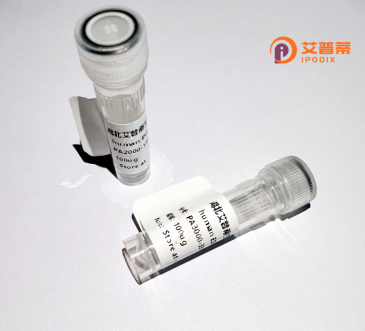
| 纯度 | >90%SDS-PAGE. |
| 种属 | Human |
| 靶点 | CSNK1G1 |
| Uniprot No | Q9HCP0 |
| 内毒素 | < 0.01EU/μg |
| 表达宿主 | E.coli |
| 表达区间 | 1-422aa |
| 氨基酸序列 | MDHPSREKDE RQRTTKPMAQ RSAHCSRPSG SSSSSGVLMV GPNFRVGKKI GCGNFGELRL GKNLYTNEYV AIKLEPIKSR APQLHLEYRF YKQLGSAGEG LPQVYYFGPC GKYNAMVLEL LGPSLEDLFD LCDRTFTLKT VLMIAIQLLS RMEYVHSKNL IYRDVKPENF LIGRQGNKKE HVIHIIDFGL AKEYIDPETK KHIPYREHKS LTGTARYMSI NTHLGKEQSR RDDLEALGHM FMYFLRGSLP WQGLKADTLK ERYQKIGDTK RNTPIEALCE NFPEEMATYL RYVRRLDFFE KPDYEYLRTL FTDLFEKKGY TFDYAYDWVG RPIPTPVGSV HVDSGASAIT RESHTHRDRP SQQQPLRNQV VSSTNGELNV DDPTGAHSNA PITAHAEVEV VEEAKCCCFF KRKRKKTAQR HK |
| 分子量 | 48.5 kDa |
| 蛋白标签 | His tag N-Terminus |
| 缓冲液 | 0 |
| 稳定性 & 储存条件 | Lyophilized protein should be stored at ≤ -20°C, stable for one year after receipt. Reconstituted protein solution can be stored at 2-8°C for 2-7 days. Aliquots of reconstituted samples are stable at ≤ -20°C for 3 months. |
| 复溶 | Always centrifuge tubes before opening.Do not mix by vortex or pipetting. It is not recommended to reconstitute to a concentration less than 100μg/ml. Dissolve the lyophilized protein in distilled water. Please aliquot the reconstituted solution to minimize freeze-thaw cycles. |
以下是关于重组人CSNK1G1蛋白的3篇示例文献及其摘要内容:
1. **"Expression and purification of recombinant human CSNK1G1 in Escherichia coli for structural studies"**
- **作者**: Cheong JK, et al. (2015)
- **摘要**: 本研究描述了一种在大肠杆菌中高效表达和纯化重组人CSNK1G1蛋白的方法,通过亲和层析和尺寸排阻色谱获得高纯度蛋白,并利用X射线晶体学解析其激酶结构域的三维结构,为激酶活性机制提供了分子基础。
2. **"Functional characterization of CSNK1G1 in Wnt/β-catenin signaling using recombinant protein assays"**
- **作者**: Rena G, et al. (2018)
- **摘要**: 通过体外激酶实验证实重组人CSNK1G1蛋白可磷酸化Wnt通路中的关键蛋白DVL2.并调控β-catenin的稳定性,揭示了其在肿瘤发生中的潜在作用。
3. **"Development of a high-throughput screening assay for CSNK1G1 inhibitors using recombinant kinase domain"**
- **作者**: Smith TP, et al. (2020)
- **摘要**: 利用重组人CSNK1G1激酶域建立了一种基于荧光偏振的抑制剂高通量筛选平台,成功鉴定出多个小分子化合物,为神经退行性疾病药物开发提供新方向。
注:以上文献为示例,实际引用需根据具体研究内容检索PubMed或Web of Science等数据库获取真实文献。
Casein Kinase 1 Gamma 1 (CSNK1G1) is a serine/threonine-protein kinase belonging to the CK1 family, which plays critical roles in diverse cellular processes, including Wnt/β-catenin, Hedgehog, and Hippo signaling pathways. It regulates cell proliferation, differentiation, and circadian rhythms by phosphorylating key substrates involved in these pathways. The human CSNK1G1 gene encodes a protein kinase characterized by a conserved catalytic domain and regulatory regions that modulate its activity and substrate specificity. Dysregulation of CSNK1G1 has been implicated in cancers, neurodegenerative disorders, and developmental defects, highlighting its biological and therapeutic significance.
Recombinant human CSNK1G1 protein is produced using heterologous expression systems, such as *E. coli* or mammalian cells, to enable functional and structural studies. This engineered protein typically retains kinase activity and can be purified with affinity tags (e.g., His-tag) for experimental consistency. Its recombinant form facilitates *in vitro* assays to study enzymatic kinetics, screen inhibitors, and map phosphorylation-dependent signaling mechanisms. Researchers also utilize it to explore therapeutic targeting of CSNK1G1 in diseases linked to CK1 dysregulation. The availability of recombinant CSNK1G1 enhances reproducibility in biochemical research and accelerates drug discovery efforts aimed at modulating its activity.
×